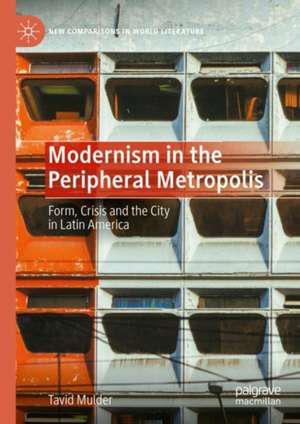Modernism in the Peripheral Metropolis: Form, Crisis and the City in Latin America: New Comparisons in World Literature
Autor Tavid Mulderen Limba Engleză Hardback – 29 aug 2023
Din seria New Comparisons in World Literature
- 15%
 Preț: 695.85 lei
Preț: 695.85 lei - 15%
 Preț: 697.32 lei
Preț: 697.32 lei - 8%
 Preț: 442.30 lei
Preț: 442.30 lei - 15%
 Preț: 584.10 lei
Preț: 584.10 lei - 15%
 Preț: 697.47 lei
Preț: 697.47 lei - 15%
 Preț: 636.76 lei
Preț: 636.76 lei - 15%
 Preț: 697.47 lei
Preț: 697.47 lei - 15%
 Preț: 585.40 lei
Preț: 585.40 lei - 9%
 Preț: 756.03 lei
Preț: 756.03 lei - 15%
 Preț: 529.28 lei
Preț: 529.28 lei - 15%
 Preț: 699.45 lei
Preț: 699.45 lei - 15%
 Preț: 498.79 lei
Preț: 498.79 lei -
 Preț: 386.99 lei
Preț: 386.99 lei - 15%
 Preț: 525.20 lei
Preț: 525.20 lei - 15%
 Preț: 579.84 lei
Preț: 579.84 lei -
 Preț: 383.12 lei
Preț: 383.12 lei -
 Preț: 388.52 lei
Preț: 388.52 lei - 18%
 Preț: 892.28 lei
Preț: 892.28 lei - 15%
 Preț: 639.08 lei
Preț: 639.08 lei - 15%
 Preț: 690.44 lei
Preț: 690.44 lei - 15%
 Preț: 697.32 lei
Preț: 697.32 lei - 15%
 Preț: 699.77 lei
Preț: 699.77 lei - 15%
 Preț: 697.65 lei
Preț: 697.65 lei -
 Preț: 357.49 lei
Preț: 357.49 lei
Preț: 697.32 lei
Preț vechi: 820.38 lei
-15% Nou
Puncte Express: 1046
Preț estimativ în valută:
133.43€ • 139.31$ • 110.43£
133.43€ • 139.31$ • 110.43£
Carte tipărită la comandă
Livrare economică 04-18 aprilie
Preluare comenzi: 021 569.72.76
Specificații
ISBN-13: 9783031340543
ISBN-10: 303134054X
Pagini: 225
Ilustrații: VII, 225 p. 5 illus.
Dimensiuni: 148 x 210 mm
Greutate: 0.43 kg
Ediția:1st ed. 2023
Editura: Springer International Publishing
Colecția Palgrave Macmillan
Seria New Comparisons in World Literature
Locul publicării:Cham, Switzerland
ISBN-10: 303134054X
Pagini: 225
Ilustrații: VII, 225 p. 5 illus.
Dimensiuni: 148 x 210 mm
Greutate: 0.43 kg
Ediția:1st ed. 2023
Editura: Springer International Publishing
Colecția Palgrave Macmillan
Seria New Comparisons in World Literature
Locul publicării:Cham, Switzerland
Cuprins
1. Album or Book?: Form and Content of the Peripheral Metropolis.- 2. “Outline of Civilization”: Maples Arce, O’Gorman, Modotti, and the Limits of the Mexican Revolution.- 3. “Facet by Facet”: José Carlos Mariátegui’s Politics of the Modernist Essay.- 4. “The Century of Phrases”: Roberto Arlt’s Negative Dialectic of Belief and Distrust.- 5. “There’s Only One Crisis. The Sexual Crisis”: Modernist Dissociation and the Reserve Army in Patrícia Galvão’s Parque Industrial.- 6. Conclusion: The Peripheralization of the Metropolis
Notă biografică
Tavid Mulder teaches literature and interdisciplinary studies at Emerson College, US. His work has appeared in journals such as Revista Hispánica Moderna, Mediations, Comparative Literature Studies and A Contracorriente.
Textul de pe ultima copertă
This book shows how Latin American writers and artists in the crisis-decades of the 1920s and 1930s used modernist techniques to explore national issues in relation to global capitalism. Drawing on a rich interdisciplinary archive of novels, poetry, essays, photography, and architecture, it includes chapters on major figures and the transformations that marked Latin American cities at the beginning of the twentieth century: the poet Manuel Maples Arce and Mexico City; the essayist José Carlos Mariátegui and Lima; the novelist Roberto Arlt and Buenos Aires; the novelist Patrícia Galvão and São Paulo. Tavid Mulder argues that the Latin American city should be understood as a peripheral metropolis: a social space that is simultaneously peripheral relative to the center of the world economy and a metropolis in relation to the region’s vast, underdeveloped hinterlands. Conceiving of modernist techniques as ways of understanding how the dualisms of Latin American societies—urban and rural, wealth and poverty, cosmopolitan and national—are bound together by the internal contradictions of capitalism, this volume insists on the ability of literary and artistic works to grasp the process through which untenable situations of crisis are not overcome but stabilized in the periphery. It thereby sheds light on issues in Latin America that have become increasingly urgent in the twenty-first century: inequality, indigenous migration, surplus populations, and anomie.
Tavid Mulder teaches literature and interdisciplinary studies at Emerson College, US. His work has appeared in journals such as Revista Hispánica Moderna, Mediations, Comparative Literature Studies and A Contracorriente.
Caracteristici
Argues that Latin American artists in the 1920s and 1930s used modernist forms to make sense of the city Explores a range of artistic media, including novels, poetry, essays, photography and architecture Offers new insights into urbanization in Latin America and the global interwar crisis of capitalism
